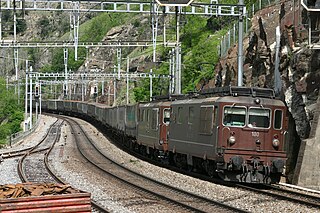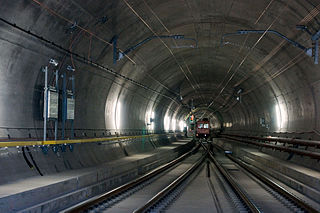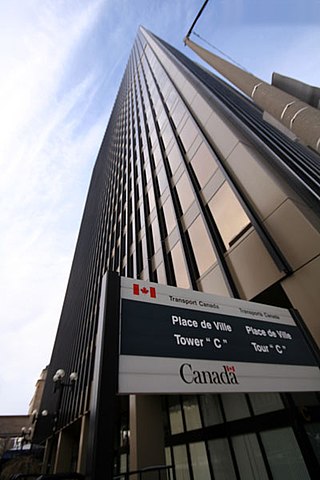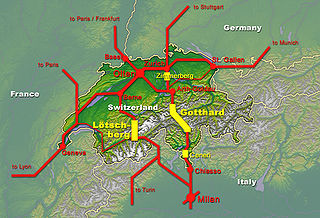
Switzerland has a dense network of roads and railways. The Swiss public transport network has a total length of 24,500 kilometres and has more than 2600 stations and stops.
The vast majority of passenger travel in the United States occurs by automobile for shorter distances and airplane or railroad for longer distances. Most cargo in the U.S. is transported by, in descending order, railroad, truck, pipeline, or boat; air shipping is typically used only for perishables and premium express shipments. Transportation is the largest source of greenhouse gas emissions in the United States.
DB Cargo is an international transport and logistics company. It is responsible for all of the rail freight transport activities of the German railway company Deutsche Bahn both inside Germany and on a global level. DB Cargo has a registered office in Mainz and a further administrative office in Frankfurt am Main.

Deutsche Bahn AG is the national railway company of Germany, and a state-owned enterprise under the control of the German government. Headquartered in the Bahntower in Berlin, it is a joint-stock company (AG) and the largest railway company in the world.

The Bern-Lötschberg-Simplon-Bahn (BLS), known between 1997 and 2006 as the BLS Lötschbergbahn, was a Swiss railway company. In 2006 the company merged with Regionalverkehr Mittelland AG to form a new company called BLS AG.

Rail transport in Switzerland is noteworthy for the density of its network, its coordination between services, its integration with other modes of transport, timeliness and a thriving domestic and trans-Alp freight system. It is made necessary by strong regulations on truck transport, and is enabled by properly coordinated intermodal logistics.
Railroad police or railway police are people responsible for the protection of railroad properties, facilities, revenue, equipment, and personnel, as well as carried passengers and cargo. Railroad police may also patrol public rail transit systems.

The Gotthard Base Tunnel is a railway tunnel through the Alps in Switzerland. It opened in June 2016 and full service began the following December. With a route length of 57.09 km (35.5 mi), it is the world's longest railway and deepest traffic tunnel and the first flat, low-level route through the Alps. It lies at the heart of the Gotthard axis and constitutes the third tunnel connecting the cantons of Uri and Ticino, after the Gotthard Tunnel and the Gotthard Road Tunnel.

Transport Canada is the department within the Government of Canada responsible for developing regulations, policies and services of road, rail, marine and air transportation in Canada. It is part of the Transportation, Infrastructure and Communities (TIC) portfolio. The current Minister of Transport is Anita Anand. Transport Canada is headquartered in Ottawa, Ontario.

The New Railway Link through the Alps, is a Swiss construction project for faster north–south rail links across the Swiss Alps. It consists of two axes with several improvements along these rails including three new base tunnels several hundred metres below the existing apex tunnels, the 57-kilometre (35 mi) Gotthard Base Tunnel, the 35-kilometre (22 mi) Lötschberg Base Tunnel, and the 15-kilometre (9.3 mi) Ceneri Base Tunnel. Swiss Federal Railways subsidiary AlpTransit Gotthard AG and BLS AG subsidiary BLS Alp Transit AG were founded for this project and built the tunnels.

The Office of Rail and Road (ORR) is a non-ministerial government department responsible for the economic and safety regulation of Britain's railways, and the economic monitoring of National Highways.

SBB Cargo is a subsidiary of Swiss Federal Railways (SBB) specialising in railfreight and is operated as the Freight division. Swiss Federal Railways is a former state-owned and -controlled company that was transformed in 1999 into a joint-stock company under special legislation following the first Swiss railway reform and divided up into three independent divisions: Passenger, Freight and Infrastructure. The headquarters of Swiss Federal Railways SBB Cargo AG, the Freight division's official designation, are in Olten. In 2013, SBB Cargo had 3,061 employees and achieved consolidated sales of CHF 953 million. In Switzerland, SBB Cargo is the market leader in rail freight, transporting over 175,000 tons of goods every day. This corresponds to the weight of 425 fully loaded jumbo jets.

The federal administration of Switzerland is the ensemble of agencies that constitute, together with the Swiss Federal Council, the executive branch of the Swiss federal authorities. The administration is charged with executing federal law and preparing draft laws and policy for the Federal Council and the Federal Assembly.

Transport in the European Union is a shared competence of the Union and its member states. The European Commission includes a Commissioner for Transport, currently Adina Ioana Vălean. Since 2012, the commission also includes a Directorate-General for Mobility and Transport which develops EU policies in the transport sector and manages funding for Trans-European Networks and technological development and innovation, worth €850 million yearly for the period 2000–2006.

Energy in Switzerland is transitioning towards sustainability, targeting net zero emissions by 2050 and a 50% reduction in greenhouse gas emissions by 2030.

Rail 2000 is a large-scale project of the Swiss Federal Railways (SBB CFF FFS) established in 1987 to improve the quality of the Swiss rail network for the New millennium. It includes measures to accelerate a number of existing connections and the modernisation of rolling stock. The federal government decision to support the project in 1986 was approved by a referendum in 1987. In 2004 the first phase was completed consisting of around 130 projects with a budget of around CHF 5.9 billion.

ADIF is a Spanish state-owned railway infrastructure manager. This state owned company reports to the Ministry of Transport and Sustainable Mobility. ADIF is charged with the management of most of Spain's railway infrastructure, that is the track, signaling and stations. It was formed in 2005 in response to European Union requirements to separate the natural monopoly of infrastructure management from the competitive operations of running train services. It is the legal successor of Renfe, Feve, and GIF.
Urban freight distribution is the system and process by which goods are collected, transported, and distributed within urban environments. The urban freight system can include seaports, airports, manufacturing facilities, and warehouse/distribution centers that are connected by a network of railroads, rail yards, pipelines, highways, and roadways that enable goods to get to their destinations.
In Switzerland a distinction is made between Social assistance in the broader sense and social assistance in the narrower sense.
DB InfraGO AG is a state-owned railway infrastructure company, operated as a wholly-owned subsidiary of Deutsche Bahn (DB) in the legal form of a stock corporation (AG), which was founded on 27 December 2023 by renaming DB Netz and merging DB Station&Service into this company.















